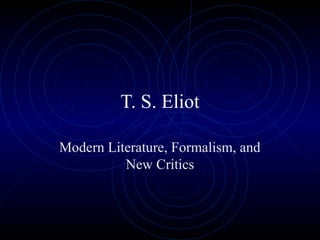
T. s. eliot
- 1. T. S. Eliot Modern Literature, Formalism, and New Critics
- 3. Terms and Concepts • Objective correlation • Dissociation of sensibility • Close reading • defamiliarization • Russian Formalism • New Criticism • Devices • Modes of Operation • Intentional Fallacy • Affective Fallacy
- 4. Focus on Form • Objective Correlation: a set of objects, a situation, a chain of events which shall be the formula of that particular emotion so as to evoke that emotion when used. • Dissociation of sensibility: a poet’s mind is constantly amalgamating disparate experience. Common man’s experiences are not related; to a poet they are all part of a whole.
- 5. The Literary Tradition •Poet must cultivate tradition and sacrifice personality •One cannot be a poet, cannot find their own voice and moderness, if they do not immerse themselves in the past, the tradition.
- 6. Universal Truth? •Seems to suggest that art is impersonal, tradition writes itself. Tradition has a perfect order that has always been, and continues to be even after a new work is added. •Poet’s personality is not what he shows to the world, but a deeper universal truth.
- 7. FORMALISM 1910-20 Includes Russian Formalism and New Critics in America • Literature is not a “window on the world” but specific literary characteristics that make it unique (from science). o It is a mural or painting that “arrests the eye” o It may resemble reality, like looking through glass, but devices produce this
- 8. Close Reading o There is a universal truth that only Art can lead us to. o It rebuts scientific ideas that all can be explained through empirical facts. Art accesses a different kind of truth. o “Close Reading” leads us to see the “concrete universals”, universal truths • Universal truth/meaning is beyond sensory experience, thus science cannot find it.
- 9. • Literary language is an “act of defamiliarization” o Art is how we experience the artfulness of an object o Not a means to know, but a vision of the object o Shklovsky calls it “roughened language” and “disordered rhythm” o Russian Formalism – scientific method applied to literature o New Critics – Anti-scientific and nonrational • Poetry uses language connotatively, evokes secondary meanings. Allows poetry to be both concrete and universal, body and spirit
- 10. Distinguishes Devices from Modes of Operation Prose • Modes of Narration • Manipulation of Plot • POV • Chronology • Story-telling devices • Sequence in order and duration Poetry • Sound in Verse • Poetic language different from ordinary language • Ordinary language is subordinate to grammar rules and must communicate information • Poetic language foregrounds literary devices • Euphony, Rhythm, Alliteration, Consonance, Repetition, Rhyme • Poetic violates rules
- 11. How does Poetry evolve? • Poetry changes because o It constantly tries to violate conventions o It reflects the evolution of literary devices o It must constantly defamiliarize o ***Poetry is autonomous from historical and social forces
- 12. The Fallacies Where is Meaning? In the words and devices o INTENTIONAL FALLACY: meaning does not reside in the intention of the author • AFFECTIVE FALLACY: meaning does not reside in the reader’s reactions